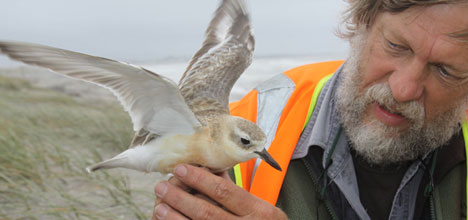Two dotterels pre-emptively captured to avoid oil contamination from the Rena disaster are breeding after being released back into the wild.
The Wildlife Response Centre is reporting monitoring of the birds has confirmed a pair released at Pukehina in November after six weeks in captivity has a two-egg nest.
Photo:MNZ
Two other pairs – one from Pukehina and one from Maketu – are preparing to breed.
Dotterel expert Dr John Dowding says the birds had adapted to life outside the oiled wildlife facility more quickly than expected and the news of breeding is heartening to the wildlife team.
There are only about 1700 New Zealand dotterels in existence – with about 120 living in the central Bay of Plenty.
Sixty of these were captured and taken into care at the Te Maunga oiled wildlife facility after Rena ran aground.
Of these, 54 have now been released back into the wild after their habitats were declared clear for their return.
John says pre-emptively capturing an endangered species to safeguard them from a known threat is a rarely tried technique, but it has been successful.
'The National Oiled Wildlife Response Team has broken new ground by pre-emptively catching and housing dotterels.
'No-one has ever had this many dotterels in captivity before – only two adult dotterels have ever been in captivity prior to this.”
The birds had been individually housed in purpose-built aviaries and looked after by wildlife experts since their capture in the first weeks of the spill response.
John says of the 60 caught, four had died in captivity of a fungal disease.
Two more were still being treated with the aim of getting them back into the wild as soon as possible.
The birds are more susceptible to the fungal infection when in captivity because they become stressed.
He says while the loss of four of the birds is disappointing, it is in line with natural mortality rates for this time of year.
'We know that on average we would have lost at least two out of these 60 to natural causes at this time of year.
'We're all saddened by the loss of three birds, but in the bigger picture, we have done the right thing.
'At a population level we have been totally successful, so we need to keep the losses in perspective.”
John says in contrast to the deaths of the three birds, the discovery yesterday that at least three pairs had already started the breeding process was hugely gratifying.
'We were very conscious when we caught the birds that it was the start of the breeding season.
'We had to balance the risk of disrupting the breeding process with the greater risk of oil from Rena.
'Four of the birds we brought in were badly oiled and required a full wash – if left in the wild, they might have died.
'Some of the others had oil on their feet, but we were able to prevent them being badly oiled.”
He says it's really gratifying to see these birds readjusting very quickly to life in the wild and just carrying on with business as usual.
'We now hope to see some chicks from these birds in the new year.”



0 comments
Leave a Comment
You must be logged in to make a comment.